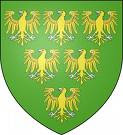Following on from my St David's Day post and Pembroke Castle, here's a tale from another Welsh castle, Carew about Princess Nest. She was the daughter of the Welsh Prince Rhys Ap Tewder, who died in 1093. Nest spent time at the court of Henry Ist, and bore him a child, a son. She then married Gerald De Windsor, an Anglo Norman Lord. He was given land at Carew and together they began to build the first castle.
Nest was considered the most beautiful woman in Wales, and there were many who admired her beauty. Despite being married to Gerald - she bore him 5 children - she was desired by others, including the Welsh Prince Owain ap Cadwgan. In a daring attack on the castle, he set it alight and captured Nest. Her husband escaped via a garderobe, aided by Nest. It may have been that Nest wasn't that distressed by being captured by Owain. She was finally rescued some 6 years later - and with 2 new children by Owain - by her husband and Owain was killed. Gerald died the following year and Nest married again, and had more children. In all, it is thought she had about 20 children. She sounds a fascinating character and died in 1136. The earliest part of Carew Castle, where Nest sheltered when the castle was under attack, can still be seen at Carew today. It would have been painted white with limestone when first built, as a reminder of the power of Norman rule.
I've posted about Carew Castle before. It was the home of Sir Rhys ap Thomas, the 'man who killed Richard III'. It's a hidden gem of a castle. From it's beginnings with Princess Nest, it's continued fortifications, and then it's turn around from defensive castle to luxury manor house, it's all to be discovered. Henry VII even visited Carew for a celebration tournament hosted by Sir Rhys and you can see the arms of Henry VII and Prince Arthur still.
One of the impressive towers at Carew.
Once the civil wars ended in 1485, Carew began alterations to turn it into a 'home'. New windows and frames were put in.
The garderobe from which Nest's husband is supposed to have escaped from.
Sir Rhys ap Thomas welcomed Henry VII to the castle. You can see the original coats of arms still intact.
The doorway underneath the arms leads to the impressive new great hall built by Sir Rhys.









